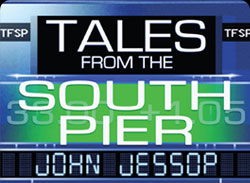Brexit is a television serial more complex than Game of Thrones, without the entertainment value of sex and violence.
By now, in the normal course of events, I should be updating you on the progress of Brexit, but this subject does not follow the normal course of events. The plain fact is that there is no identifiable course. There is nothing to report because for the past several months nothing has changed – at least, nothing substantive.
That is not strictly true: Prime Minister Theresa May has three times put her negotiated deal to Parliament for approval and three times Parliament has rejected it. The talk around Westminster now is that, later this week, she will present it for the fourth time of asking, with only a slightly improved chance of getting it through. Even Peter denied his savior only three times.
Mind you, it got him elected Pope and beatified. Such blessings are unlikely to be conferred on Prime Minister Theresa May, although she might be forgiven for thinking that they ought to be, given her dedication to what has become known as Her Deal. Parliament anyway is not in a forgiving mood. Mrs. May is unlikely to be in her job for much longer. The same might be said of several dozen members of parliament if the voters are given the opportunity to have their say.
Meanwhile, back in what we laughingly call the real world, the House of Commons, resembling not so much a parliament as a rowdy, generously liquefied rugby club dinner, has voted on four alternative plans proposed by members from both sides of the political divide. Each one – I won’t bore you with the details, to the extent that I understand them – has been rejected in turn. In consequence, after nearly three years since Britain declared that it wished to leave the European Union, the political impasse remains firmly in place.
Leaders of the EU’s twenty-seven states can only shake their heads in bemusement. They do so with an unremitting unanimity that is as frightening as it is extraordinary. In an historical context, it is a strange reversal; for a century or more Europeans were at each other’s throats while Britain looked on benignly, secure in what it regarded as an enlightened policy of Splendid Isolation. Now, the positions are reversed. Americans and other foreigners that nurse a sentimental good will for Britain are likewise bewildered.
As for Britons, they are unanimous in only one respect: utter confusion. Britons who voted ‘leave’ feel betrayed. Those who voted ‘remain’ feel affronted. Ironically, putting the whole issue to those same voters – as has been suggested by a growing minority – would be regarded by the rest as the ultimate betrayal. How asking voters to settle what the government and parliament have shown themselves incapable of resolving would represent a betrayal has not been explained, but then little else has been either.
What remains is a mess. In the three years since Britain declared its intention to leave the EU, through a legal device called Article 50, Britain has no more idea what the terms should be, and a growing body of opinion holds that perhaps Britain should not leave the EU after all. In electoral terms, Britain is back to square one – hopelessly divided, ever more confused, and now embittered.
I have asserted in this space, perhaps on more occasions than I can remember – or that readers would wish to be reminded – that the only solution is to suspend Article 50, in order to spend some time doing some serious thinking about what should be done, and then start the whole process over again. Or not, as the case may be. That being the most sensible course of action, it is of course the very last thing that is likely to happen. And the EU would need solid evidence that Britain was capable of serious thinking even to allow it.
Mr. Micawber went through life hoping that ‘something would show up’. Mrs. May seems to be doing the same thing.
So far, what has showed up is precisely nothing. But we live in hope, though only on the premise that it is always better to travel hopefully than to arrive.
I shall let you know if or when we do.


Be First to Comment